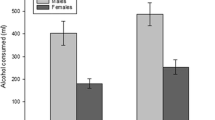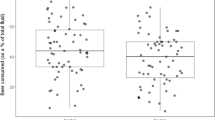Abstract
Background
Recent studies demonstrated that alcohol impairs inhibitory control of behavioural responses.
Aims
We questioned whether alcohol via its disinhibiting effects would also impair the inhibition of an instrumental avoidance response in the presence of a safety signal.
Design
Thirty-six moderate social drinkers were randomly allocated to receiving either alcohol (0.8 g/kg) or placebo before performing an instrumental avoidance procedure. White noise of 102 db was used as aversive outcome presented at a variable interval schedule in S+ trials, while no noise was presented in S− trials. An instrumental response (repeated space bar presses to avoid the noise presented at a variable interval) abolished the noise. The Stop Signal task and the affective Go/No-Go task were administered as inhibitory control tasks.
Results
Alcohol did not change the avoidance response rate in the presence of S− (safety signal). However, participants under alcohol performed the avoidance response to a lower extent than placebo subjects in S+ trials. Alcohol impaired performance in the Stop Signal task and increased the number of commission errors in the affective Go/No-Go task. Conditioned attentional and emotional responses to the S+ as well as knowledge of stimulus–response outcome contingencies were not affected by alcohol.
Conclusions
Acute alcohol may decrease the motivation to avoid negative consequences and thus might contribute to risky behaviour and binge drinking.




Similar content being viewed by others
References
Bouton ME, Moody EW (2004) Memory processes in classical conditioning. Neurosci Biobehav Rev 28:663–674
Dickinson A, Balleine B (2002) The role of learning in the operation of motivational systems. In: Pashle H, Gallistel R (eds) Steven's handbook of experimental psychology. Learning, motivation, and emotion, 3rd edn. Wiley, New York, pp 497–533
Duka T, Stephens DN, Russell C, Tasker R (1998) Discriminative stimulus properties of low doses of ethanol in humans. Psychopharmacology (Berl) 136:379–389
Duka T, Townshend JM (2004) The priming effect of alcohol pre-load on attentional bias to alcohol-related stimuli. Psychopharmacology (Berl) 176:353–361
Erikson K, Drevets WC, Clark L, Cannon DM, Bain EE, Zarate CA Jr, Charney DS, Sahakian BJ (2005) Mood-congruent bias in affective go/no-go performance of unmedicated patients with major depressive disorder. Am J Psychiatry 162:2171–2173
Field M, Cox WM (2008) Attentional bias in addictive behaviors: a review of its development, causes, and consequences. Drug Alcohol Depend 97:1–20
Franken IH (2003) Drug craving and addiction: integrating psychological and neuropsychopharmacological approaches. Prog Neuropsychopharmacol Biol Psychiatry 27:563–579
Fromme K, Stroot E, Kaplan D (1993) Comprehensive effects of alcohol: development and psychometric assessment of a new expectancy questionnaire. Psychological Assessment 5:19–26
Glautier S, Rigney U, Willner P (2001) Motivation for alcohol assessed by multiple variable interval schedule behaviour: effects of reward size and alcohol cues. Behav Pharmacol 12:81–89
Goldstein RZ, Volkow ND (2002) Drug addiction and its underlying neurobiological basis: neuroimaging evidence for the involvement of the frontal cortex. Am J Psychiatry 159:1642–1652
Grossman SP, Miller NE (1961) Control for stimulus-change in the evaluation of alcohol and chlorpromazine as fearreducing drugs. Psychopharmacologia 2:342–351
Gulick D, Gould TJ (2007) Acute ethanol has biphasic effects on short- and long-term memory in both foreground and background contextual fear conditioning in C57BL/6 mice. Alcohol Clin Exp Res 31:1528–1537
Hogans AF, Moreno OM, Brodie DA (1961) Effects of ethyl alcohol on EEG and avoidance behaviour of chronic electrode monkeys. Am J Physiol 201:434–436
Hogarth L, Dickinson A, Hutton SB, Elbers N, Duka T (2006) Drug expectancy is necessary for stimulus control of human attention, instrumental drug-seeking behaviour and subjective pleasure. Psychopharmacology (Berl) 185:495–504
Hogarth L, Duka T (2006) Human nicotine conditioning requires explicit contingency knowledge: is addictive behaviour cognitively mediated? Psychopharmacology (Berl) 184:553–566
Loeber S, Duka T (2009) Extinction learning of stimulus reward contingencies: the acute effects of alcohol. Drug Alcohol Depend 102:56–62
Loeber S, Vollstädt-Klein S, von der Goltz C, Flor H, Mann K, Kiefer F (2009) Attentional bias in alcohol-dependent patients: the role of chronicity and executive functioning. Addict Biol 14(2):194–203
Mehrabian A, Russell JA (1978) A questionnaire measure of habitual alcohol use. Psychol Rep 43:803–806
Murphy FC, Sahakian BJ, Rubinsztein JS, Michael A, Rogers RD, Robbins TW, Paykel ES (1999) Emotional bias and inhibitory control processes in mania and depression. Psychol Med 29:1307–1321
Pautassi RM, Sanders S, Miller S, Spear N, Molina JC (2006) Early ethanol's anxiolytic effects assessed through an unconditional stimulus revaluation procedure. Alcohol Clin Exp Res 30:448–459
Petry NM (1998) Ethanol's effects on operant responding: differentiating reinforcement efficacy and motor performance. Physiol Behav 64:117–122
Ramchandani VA, O'Connor S, Neumark Y, Zimmermann US, Morzorati SL, de Wit H (2006) The alcohol clamp: applications, challenges, and new directions—an RSA 2004 symposium summary. Alcohol Clin Exp Res 30:155–164
Rey A (1964) L'examen clinque en psychologie. Universitaires de France, Universitaires de France
Reynolds GS, van Sommers P (1960) Effects of ethyl alcohol on avoidance behaviour. Science 132:42–43
Robbins TW (2007) Shifting and stopping: fronto-striatal substrates, neurochemical modulation and clinical implications. Philos Trans R Soc Lond B Biol Sci 362:917–932
Robinson TE, Berridge KC (2000) The psychology and neurobiology of addiction: an incentive-sensitization view. Addiction 95(Suppl 2):S91–S117
Rose AK, Duka T (2007) The influence of alcohol on basic motoric and cognitive disinhibition. Alcohol Alcohol 42:544–551
Roiser J, Farmer A, Lam D, Burke A, O'Neill N, Keating S, Smith GP, Sahakian B, McGuffin P (2008) The effect of positive mood induction on emotional processing in euthymic individuals with bipolar disorder and controls. Psychol Med 39(5):785–791
Schoenmakers T, Wiers RW, Field M (2008) Effects of a low dose of alcohol on cognitive biases and craving in heavy drinkers. Psychopharmacology (Berl) 197:169–178
Schweizer TA, Vogel-Sprott M, Danckert J, Roy EA, Skakum A, Broderick CE (2006) Neuropsychological profile of acute alcohol intoxication during ascending and descending blood alcohol concentrations. Neuropsychopharmacology 31:1301–1309
Townshend JM, Duka T (2005) Binge drinking, cognitive performance and mood in a population of young social drinkers. Alcohol Clin Exp Res 29:317–325
Weafer J, Fillmore MT (2008) Individual differences in acute alcohol impairment of inhibitory control predict ad libitum alcohol consumption. Psychopharmacology (Berl) 201:315–324
Wilson MA, Burghardt PR, Ford KA, Wilkinson MB, Primeaux SD (2004) Anxiolytic effects of diazepam and ethanol in two behavioural models: comparison of males and females. Pharmacol Biochem Behav 78:445–458
Acknowledgements
This work was funded by a grant from the Deutsche Forschungsgemeinschaft No LO 1492/2-1/2 and, in part, by Medical Research Council Grant No G9806260. The authors certify that there is no actual or potential conflict of interest in relation to this article. The experiment performed complies with the current laws of the UK.
Author information
Authors and Affiliations
Corresponding author
Rights and permissions
About this article
Cite this article
Loeber, S., Duka, T. Acute alcohol decreases performance of an instrumental response to avoid aversive consequences in social drinkers. Psychopharmacology 205, 577–587 (2009). https://doi.org/10.1007/s00213-009-1565-9
Received:
Accepted:
Published:
Issue Date:
DOI: https://doi.org/10.1007/s00213-009-1565-9




